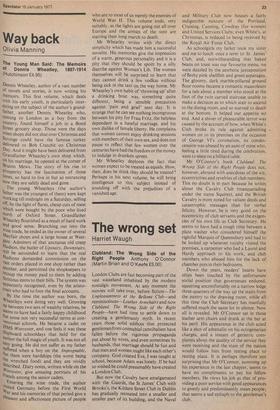Way back
Olivia Manning
The Young Man Said: The Memoirs of Dennis Wheatley, 1897-1914 (Hutchinson £4.95)
Dennis Wheatley, author of a vast number of novels and stories, is now writing his memoirs. This first volume, which deals With his early youth, is particularly interesting on the subject of the author's grandfather, another Dennis Wheatley who, Coming to London as a boy from the Country, found himself a job in a Bond Street grocery shop. Those were the days When shops did not shut over Christmas and Scrooge could have the famous turkey delivered to Bob Cratchit on Christmas bay. And it might have been delivered from Grandfather Wheatley's own shop which, O n his marriage, he opened at the corner of Bruton Mews. The story of his rise to Prosperity has the fascination of those times, so hard to live in but so entrancing now they are safely dead and gone.
The young Wheatleys (the author's father was the youngest of them) were kept working till midnight on a Saturday, selling I3ff, by the light of flares, cheap cuts of meat which were bought by the poor who lived north of Oxford Street. Grandfather Wheatley flourished as a result of hard work and good sense. Branching out into the wine trade, he ended as the owner of several Mayfair shops and a large house at West Admirers of that unctuous old creep iludSon, the butler of Upstairs, Downstairs, w,.111 be astounded to learn that the real Hudsons demanded commission on the vast orders placed in one shop rather than another, and permitted the shopkeepers to ,recoup the money paid to them by adding fictitious items to their bills. The system was apparently recognised, even by the aristocrats who had to foot the final accounts. EtY the time the author was born, the Wheatleys were doing very well. Growing UP between two sets of wealthy relatives, he seems to have had a fairly happy childhood hilt some not very successful terms at conventional schools. He became a cadet on HMS • Worcester, and one feels it was these Shipboard schooldays that held for the author the full magic of youth. It was not all easy going. He did not suffer as my father suffered when -a boy on the Impregnable, but there were hardships (the worst being the wretched food) and they are vividly Scribed. Diary notes, written while on the 7.0/Tester, give amusing portraits of his 'Fiends among the senior cadets. Entering the wine trade, the author visited Germany before the First World War and his memories of that period give a Pleasant and affectionate picture of people
who are to most of us merely the enemies of World War II. This volume ends, very suitably, as the lights are going out all over Europe and the armies of the west are starting their long march to death.
Mr Wheatley writes with the direct simplicity which has made him a successful novelist. His memories give the impression of a warm, generous personality and it is a pity that they should be spoilt by a silly diatribe against Women's Lib. The women themselves will be surprised to learn that they cannot drink a few vodkas without being sick in the taxi on the way home. Mr Wheatley's own habit of 'throwing up' after a drinking bout was something quite different, being a sensible precaution against 'pain and grief' next day. It is strange that he can see nothing incongruous between his pity for Frau Fritz, the helpless dependant in a hateful marriage, and his own dislike of female liberty. He complains that women cannot enjoy drinking sessions with members of their own sex, and does not pause to reflect that few women over the centuries have had the freedom or the money to indulge in drunken sprees.
Mr Wheatley deplores the fact that women expect to be treated as equals. How, then, does he think they should be treated ? Perhaps in his next volume, he will bring intelligence to this subject instead of sounding off with the prejudices of a vanished age.


































 Previous page
Previous page